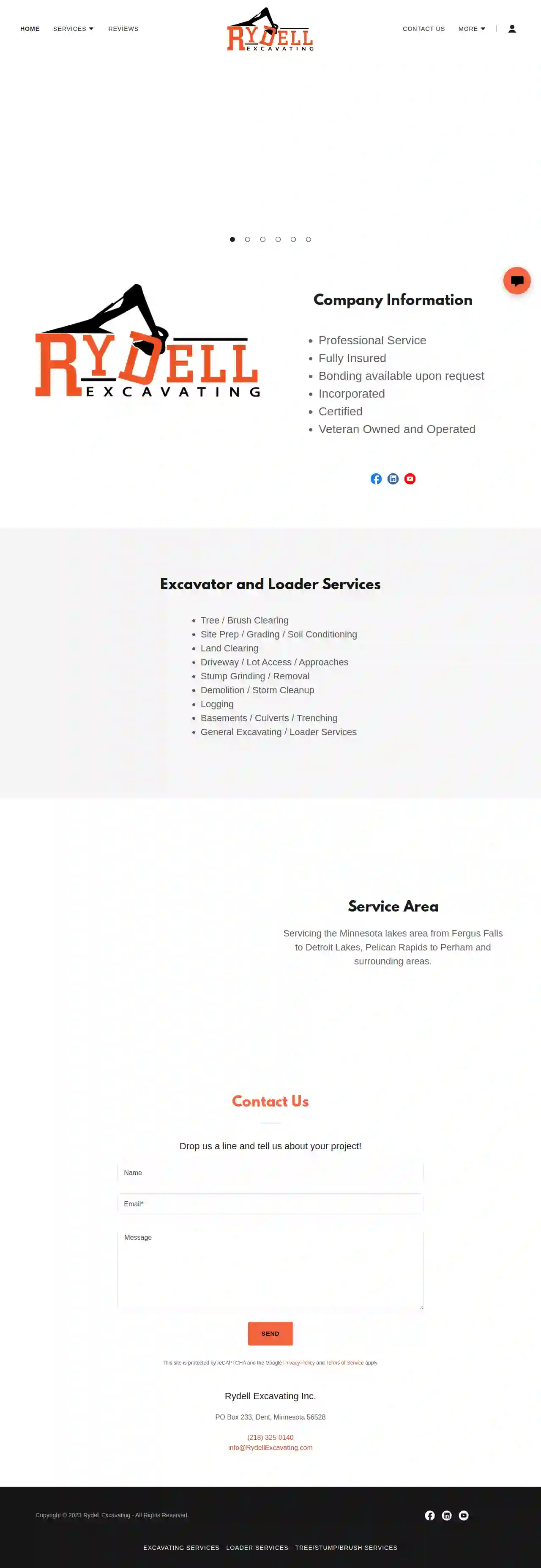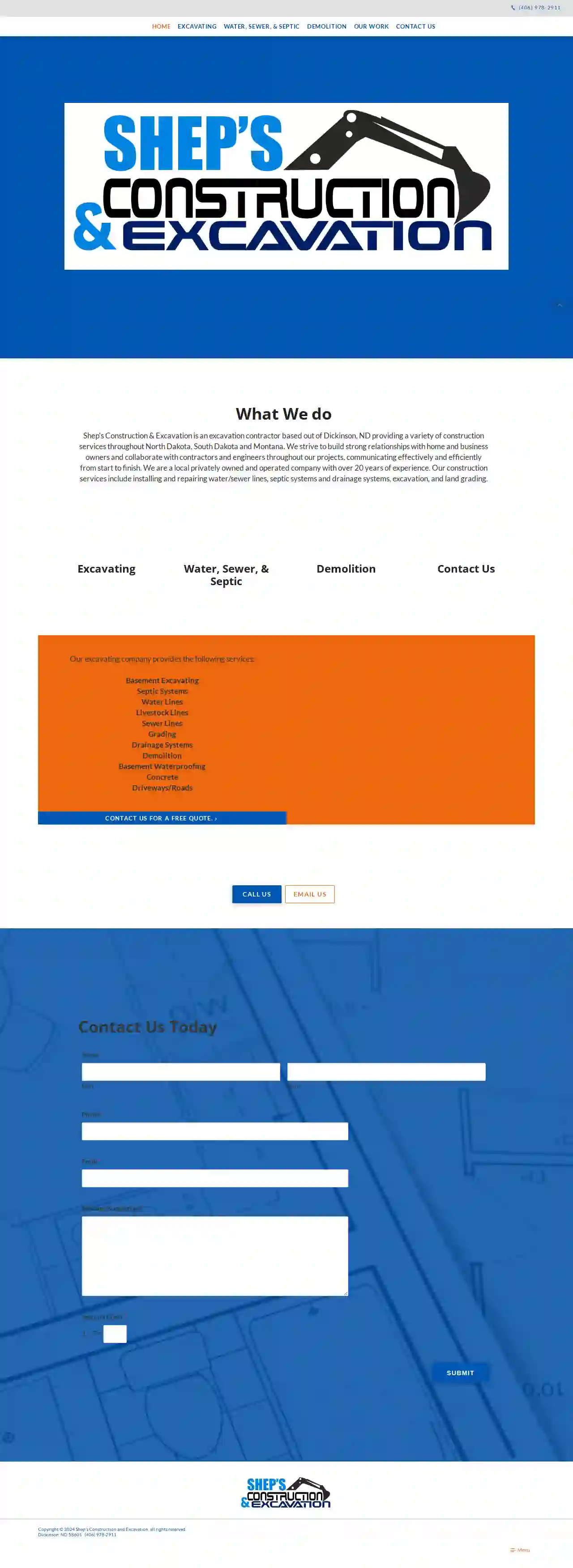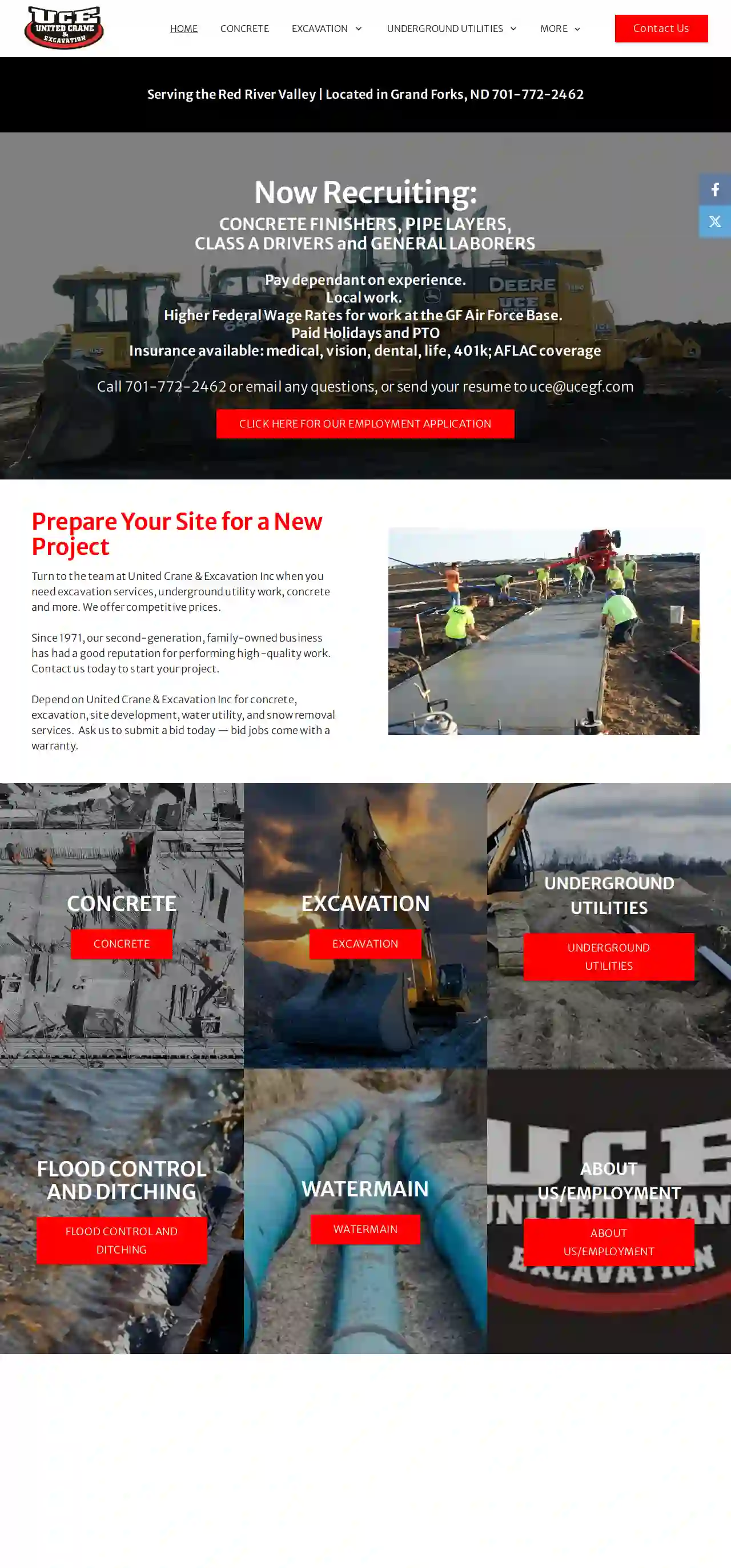Dirt Contractors Fargo
Best Dirt Removal in Fargo
Receive up to 3 Dirt Removal quotes for your project today! Compare profiles, reviews, accreditations, portfolio, etc... and choose the best service.

Rydell Excavating
516 reviewsPO Box 233, Dent, 56528, USCompany Information Rydell Excavating is a professional excavating company serving the Minnesota lakes area. We are fully insured and bonding is available upon request. We are a veteran-owned and operated business, committed to providing high-quality services to our clients. Excavator and Loader Services We offer a wide range of excavating and loader services, including: Tree / Brush Clearing Site Prep / Grading / Soil Conditioning Land Clearing Driveway / Lot Access / Approaches Stump Grinding / Removal Demolition / Storm Cleanup Logging Basements / Culverts / Trenching General Excavating / Loader Services Service Area We service the Minnesota lakes area from Fergus Falls to Detroit Lakes, Pelican Rapids to Perham and surrounding areas.
- Services
- Why Us?
- Gallery
Get Quote
JCR Excavating LLC
1Williston, USCrafting Terrain Founded in 2007, JCR Excavating began as a dream, steadily evolving into one of the leading excavating companies in North Dakota. We’ve weathered economic downturns, expanded our operations, and built a tight-knit team of professionals. Dedicated to delivering impeccable workmanship, our rich history and hands-on leadership set us apart. Williston's Excavation Specialist At JCR Excavating, we integrate cutting-edge technologies to help us deliver precision results that match your project plans down to the last inch. By leveraging excavation software like Topcon GPS and John Deere 3D SmartGrade, we can dig to exact depths or grade to the perfect slope. With JCR, there’s no room for error. Comprehensive Excavation in Western North Dakota JCR Excavating proudly offers a range of excavating services, catering to the unique demands of Williston and its surrounding regions.
- Services
- Why Us?
- Gallery
Get Quote
Shep's Construction and Excavation
52 reviewsBismarck, US- Services
- Why Us?
Get Quote- Ki
Kioti Contracting | Excavation & Septic Service
11 reviewsBismarck, US- Services
- Why Us?
- Gallery
Get Quote 
United Crane & Excavation Inc
4.26 reviewsBismarck, US- Services
- Why Us?
Get Quote
Over 3,943+ Excavation Contractors registered
Our excavation providers operate in Fargo & beyond!
ExcavationHQ has curated and vetted the Best Excavation Businesses in and around Fargo. Find a reliable pro today.
Frequently Asked Questions About Dirt Contractors
- Erosion Control: Berms can intercept and slow down runoff, preventing soil erosion and sedimentation.
- Noise Reduction: Berms can act as noise barriers, reducing noise pollution from traffic, construction, or industrial activities.
- Visual Screening: Berms can block unsightly views, create privacy, or define property boundaries.
- Security: Berms can serve as security barriers, deterring unauthorized access or vehicle intrusion.
- Landscaping: Berms can enhance landscaping by creating elevation changes, providing planting areas, or defining garden beds.
- Clean Fill: Consists of uncontaminated soil, rock, or gravel, free from organic matter, debris, or hazardous substances. Suitable for most construction and landscaping projects.
- Structural Fill: A compacted granular fill, typically gravel, crushed stone, or a mixture of both, used for structural support and drainage. Ideal for foundations, roadways, and retaining walls.
- Engineered Fill: A specifically designed and blended soil mix with controlled properties, such as compaction, drainage, or bearing capacity, tailored for particular applications.
- Unsuitable Fill: Materials like topsoil, organic matter, or contaminated soil that are not suitable for structural fill due to their potential for decomposition, settlement, or environmental concerns.
- Online Directories: Utilize online directories like ExcavationHQ that specialize in connecting homeowners and businesses with qualified contractors. You can filter your search by location, service type, and read reviews from previous customers.
- Referrals: Ask friends, family, neighbors, or colleagues for recommendations based on their experiences with dirt contractors.
- Local Building Supply Stores: Inquire at local building supply stores, as they often have connections with contractors in the area.
- Online Reviews: Check online review platforms like Google My Business, Yelp, and Angie's List for insights into contractor reputations and customer feedback.
What is a dirt berm, and what are its uses?
What are the different types of fill dirt?
What is the difference between topsoil and fill dirt?
Topsoil: The uppermost layer of soil, characterized by its rich organic matter content, nutrients, and dark color. It's essential for supporting plant growth and is commonly used for gardening, landscaping, and lawn establishment.
Fill Dirt: Primarily composed of subsoil or excavated materials, generally lacking the organic matter and nutrients found in topsoil. It's typically less fertile and used for structural purposes, such as filling in low areas, leveling ground, or creating raised beds.
Understanding the difference between topsoil and fill dirt is crucial for choosing the appropriate soil type for your specific project needs.
How do I find a reputable dirt contractor near me?
What is a dirt berm, and what are its uses?
- Erosion Control: Berms can intercept and slow down runoff, preventing soil erosion and sedimentation.
- Noise Reduction: Berms can act as noise barriers, reducing noise pollution from traffic, construction, or industrial activities.
- Visual Screening: Berms can block unsightly views, create privacy, or define property boundaries.
- Security: Berms can serve as security barriers, deterring unauthorized access or vehicle intrusion.
- Landscaping: Berms can enhance landscaping by creating elevation changes, providing planting areas, or defining garden beds.
What are the different types of fill dirt?
- Clean Fill: Consists of uncontaminated soil, rock, or gravel, free from organic matter, debris, or hazardous substances. Suitable for most construction and landscaping projects.
- Structural Fill: A compacted granular fill, typically gravel, crushed stone, or a mixture of both, used for structural support and drainage. Ideal for foundations, roadways, and retaining walls.
- Engineered Fill: A specifically designed and blended soil mix with controlled properties, such as compaction, drainage, or bearing capacity, tailored for particular applications.
- Unsuitable Fill: Materials like topsoil, organic matter, or contaminated soil that are not suitable for structural fill due to their potential for decomposition, settlement, or environmental concerns.
What is the difference between topsoil and fill dirt?
Topsoil: The uppermost layer of soil, characterized by its rich organic matter content, nutrients, and dark color. It's essential for supporting plant growth and is commonly used for gardening, landscaping, and lawn establishment.
Fill Dirt: Primarily composed of subsoil or excavated materials, generally lacking the organic matter and nutrients found in topsoil. It's typically less fertile and used for structural purposes, such as filling in low areas, leveling ground, or creating raised beds.
Understanding the difference between topsoil and fill dirt is crucial for choosing the appropriate soil type for your specific project needs.
How do I find a reputable dirt contractor near me?
- Online Directories: Utilize online directories like ExcavationHQ that specialize in connecting homeowners and businesses with qualified contractors. You can filter your search by location, service type, and read reviews from previous customers.
- Referrals: Ask friends, family, neighbors, or colleagues for recommendations based on their experiences with dirt contractors.
- Local Building Supply Stores: Inquire at local building supply stores, as they often have connections with contractors in the area.
- Online Reviews: Check online review platforms like Google My Business, Yelp, and Angie's List for insights into contractor reputations and customer feedback.